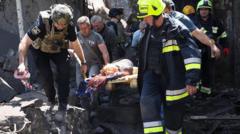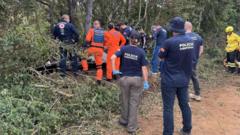In a bid to revitalize its tourism sector, North Korea has announced the opening of the Wonsan Kalma Coastal Tourist Zone, set to welcome domestic visitors starting July 1. State media reports indicate that this lavish beach resort, which had previously been delayed for years, is part of leader Kim Jong Un's strategy to enhance North Korea’s appeal amidst ongoing international sanctions. The resort is built along a picturesque 4km stretch of beach on the country's east coast and boasts the capacity to host up to 20,000 guests in various facilities, including hotels and recreational amenities, though details remain unverified.
North Korea Launches Wonsan Kalma Resort to Boost Tourism Amid Sanctions

North Korea Launches Wonsan Kalma Resort to Boost Tourism Amid Sanctions
As North Korea attempts to revive tourism, the Wonsan Kalma resort opens for domestic visitors on July 1, aiming to attract foreign tourists in the future.
Kim Jong Un, who spent part of his early years in Wonsan, aims to transform this coastal area, which previously served as a site for missile tests, into a premier tourist destination. However, tourism to North Korea has been severely impacted by the COVID-19 pandemic, with borders remaining closed until mid-2023. Notably, recent openings to Russian and Western tourists have faced abrupt halts, signaling uncertainty about the future of foreign tourism in the reclusive nation.
Some travel experts express skepticism about the resort's appeal, suggesting that it might not attract Western tourists who typically prefer historic sites and landmarks in major cities like Pyongyang. Conversely, certain tour operators believe that the uniqueness of the Wonsan project could intrigue a niche market of travelers. Observers also note that North Korea's ongoing close relationship with Russia, as evidenced by military support and transportation connections, may influence the nature of tourism in the near future.
In conclusion, the Wonsan Kalma resort represents North Korea's efforts to venture into tourism, a move viewed as a potential financial lifeline amidst strict sanctions. While the initial focus is on domestic travelers, further opening to international tourists remains uncertain as the nation grapples with its economic and diplomatic challenges.
Some travel experts express skepticism about the resort's appeal, suggesting that it might not attract Western tourists who typically prefer historic sites and landmarks in major cities like Pyongyang. Conversely, certain tour operators believe that the uniqueness of the Wonsan project could intrigue a niche market of travelers. Observers also note that North Korea's ongoing close relationship with Russia, as evidenced by military support and transportation connections, may influence the nature of tourism in the near future.
In conclusion, the Wonsan Kalma resort represents North Korea's efforts to venture into tourism, a move viewed as a potential financial lifeline amidst strict sanctions. While the initial focus is on domestic travelers, further opening to international tourists remains uncertain as the nation grapples with its economic and diplomatic challenges.




















